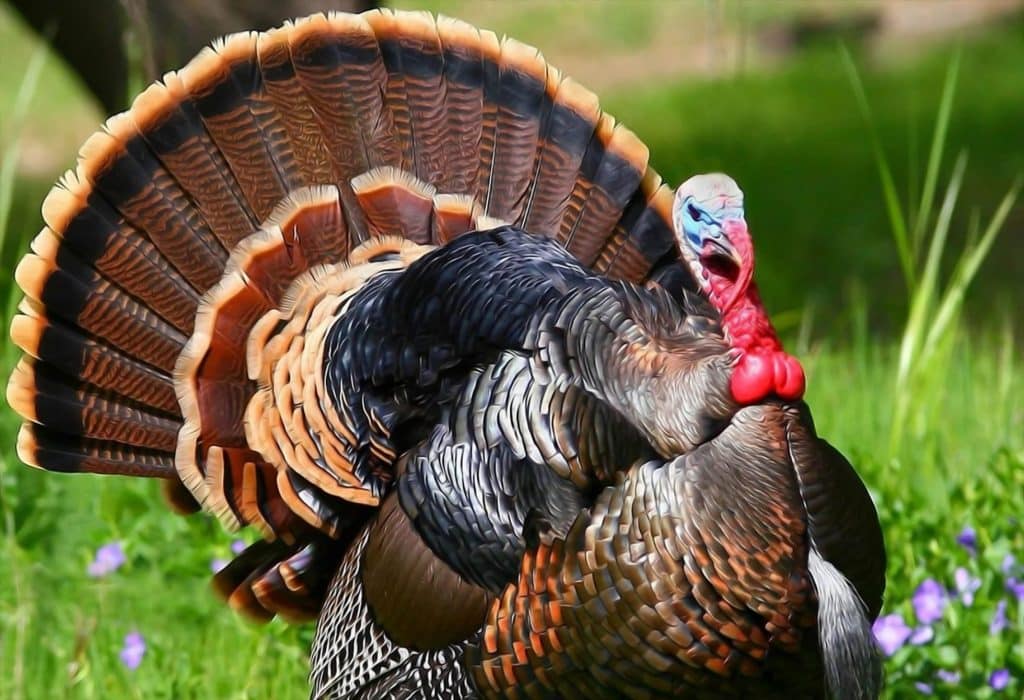Every year hunters miss out on great birds because of poor shot placement. Bow hunting for turkeys might seem like it would be simple but it’s actually quite challenging. Unlike with deer turkeys have a surprisingly small kill zone. Unfortunately this means that there are far too many turkeys wounded each year and not properly harvested.
As a hunter it’s your responsibility to make sure you get off a clean shot providing a humane kill. Not only do you owe it to the turkey you owe it to yourself. You spent far too much time out in the field and doing hunting research to miss out on that prized bird.
Taking Aim With Your Bow
Taking aim with the bow is completely different than when using a shotgun. Take everything you thought you knew about turkey hunting and throw it out the window. When bow hunting you’re going after severe blood loss as opposed to shock and trauma. You’re going to want to use wider broadheads like these Rage Extreme Turkey Broadheads.
Try To Pin The Turkey
Unlike hunting with a shotgun bow hunting most likely won’t be an instant death. Unless you want to track a fast moving turkey you’re going to want to make sure he stays put after the shot. To avoid chasing after an injured bird you’re going to want to anchor or pin him down.
To anchor him down simply aim just above the beard or the anal vent when he’s strutting away. Side shots though extremely effective are the most difficult to master.
What’s The Best Turkey Shot Placement?
You really have to give a lot of respect to Turkey hunters after looking at their kill zone. Turkeys vitals are extremely small offering a minuscule margin of error. About the size of a softball, your shot placement needs to be perfect. Subtle movements could mean the difference between a successful harvest and a injured bird.
Slight changes in the turkeys posture will significantly impact your target zone. Below are a few of the best spots to shoot a turkey ensuring proper kill.
Shooting A Turkeys Broadside
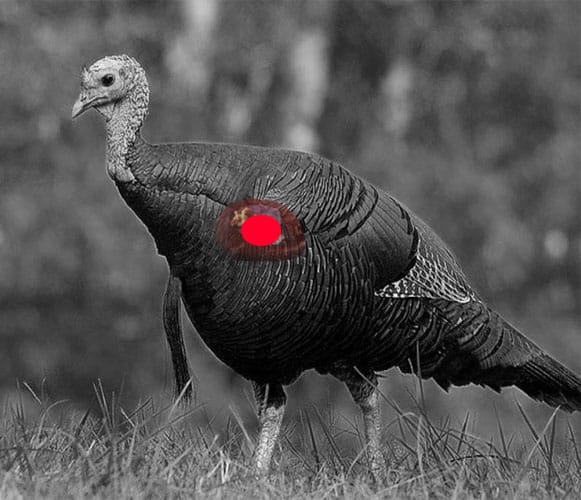
Unless you’re a veteran turkey hunter you probably have no idea where to actually shoot a turkey broadside. The place that everybody thinks they should shoot is actually too far forward. If you’re new to turkey hunting I would highly suggest purchasing a 3d turkey target. I’ve been using the Rinehart Tom Turkey Target and it would be perfect if only they included kill zones.
Turkey vitals are positioned farther back and much higher than most people realize. If you want to get a kill shot you’re going to need to aim right where the wing connects to the body. If you hit the spot your Broadhead should pierce both wings, the heart and lungs. Unless the arrow passes through this shot should prevent the bird from flying.
Turkey Standing Up and Facing Away Spine Shot
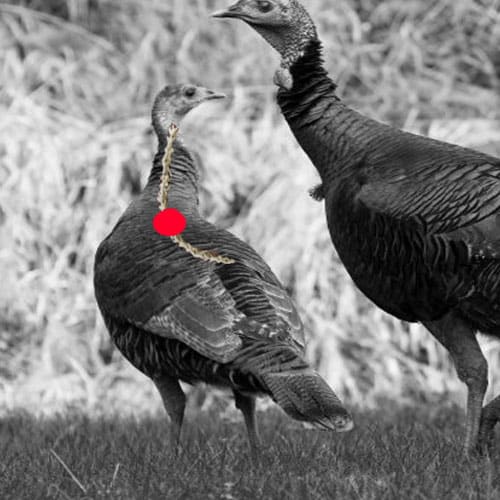
Taking a spine shot will immediately immobilize the bird, but it’s a tough shot to pull off. Breaking the backbone will guarantee the turkey dies quickly, but whether or not you should take it is highly dependent on the situation. The only time you can really take the shot is when he standing tall with his back towards you. Just aim high and center to hit the spine.
The biggest problem with going after the spine shot is that you can’t do it while the birds feeding. If he’s in the feeding position/walking with his head down you can either wait or get his attention with the call. When he’s out of position his fines going to be in motion making for a un-ethical shot.
The only time that I’m going to go after a spine shot is when I’m using a wide cutting broadhead. Something like this G5 Montec Broadhead will be wide enough to take out the spine without impacting penetration.
Turkey Facing You
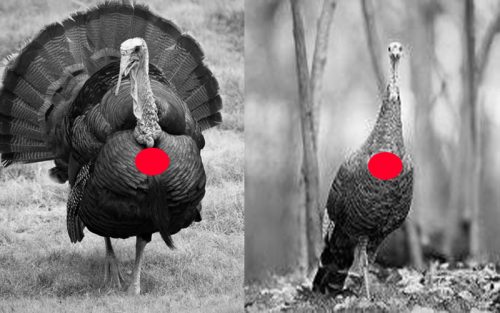
Many hunters hate shooting a turkey that’s facing them, but it’s easily one of my favorite shots. Shooting center and high will almost guarantee a kill shot. Depending on how high you hit you’ll take out either the heart, lungs, spine or more likely a combination of the 3. Just make sure you don’t aim to low and hit the breast, because that will just leave you with a made and injured bird.
The only downside to shooting a tom that’s staring you down is that they can be easily spooked. Just try and get your shot off as quietly as possible and aim about four inches below the neck. You might want to wait until he turns away to draw your bow.
Quartering
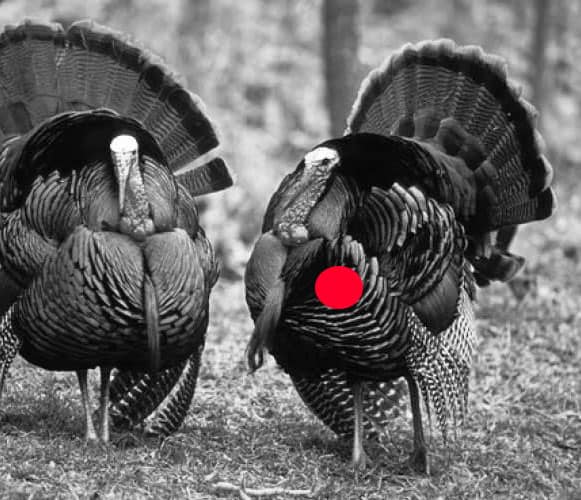
It might not seem like much of a difference, but a lot of hunters have a hard to shooting a quartering turkey. The easiest way to find the vital zone is to use the turkeys neck and legs as a reference point. I like to aim directly above the far leg almost in line with the neck and a couple inches below the shoulder.
Aiming high on a quartering bird is almost always going to be better than low. The perfect shot will take out the heart and lungs whereas a high shot will take out the spine which is equally effective.
Facing Away
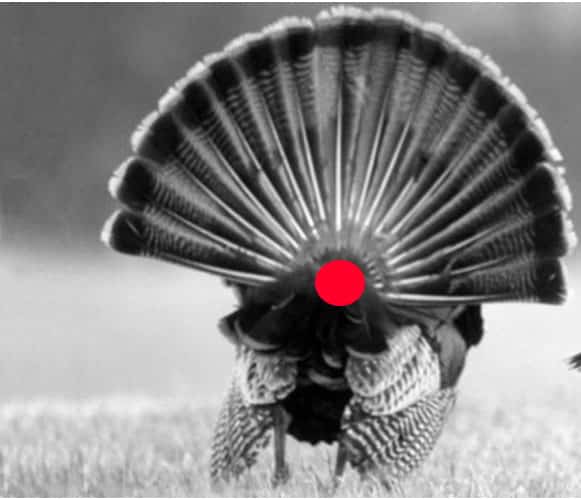
When the turkey is walking away from you have an extremely easy shot. The best part about shooting a turkey facing away from you is that he won’t be able to see you. Hopefully his fan will block his view giving you a clear shot on his Anus. With this shot I would once again use a deep penetrating broadhead like the G5 Montec Broadhead.
Head or Neck Shot
Getting off a clean head or neck shot will almost guarantee a dead bird. Just like with a shotgun shooting the head or neck will cause an almost instant death. The only downside is that it’s going to be a difficult shot while the birds moving.
To get off a head or neck shot wait until the turkey is almost completely stationary. Draw him in close and release your arrow. Just be careful because this is a difficult shot and turkeys bounce and sway more than a drunk.
Other Shot Placement Tips
1. Try Reducing Your Draw Weight
Many hunters prefer reducing their draw weight on a turkey bow. Reducing your draw weight should help prevent pass through shots. With an arrow stuck in his side it’s going to be much harder for the injured turkey to escape. If possible you always want your arrow to get stuck in the side of the bird.
2. Avoid Shooting a Strutting Bird
When turkey hunting you should always try to avoid shooting a strutting bird. If possible you’ll want to let the bird naturally stand up and stretch his neck. After waiting a little while a quick cluck on a turkey call should make him rise his head. This Primos Magnetic Box Call should raise up his head in seconds. By stopping and strutting his neck he’ll provide a larger target area offering a smaller margin of error.
3. Learn to Estimate Distance
The wild turkey is an extremely tough bird so make sure your aim is on point. Without knowing the proper distance you could take shots that risk wounding the bird. Most turkey misses are going to be results of yardage estimation mistakes. When your adrenaline starts pumping you’ll have to make a quick decision and probably won’t be able to use a range finder.
To help me figure out range I like to set my 3d target out to realistic differences and visually verifying the distance. You can also try taking a guess on a distance and pacing it out to see how far you’re off. After a little while you should be able to guess with pretty good accuracy.
4. Be Patient
Believe me when I say I’m tired of always being told I need to be patient. I swear everything in life that’s worth doing requires patients to pull off. Take your time and be sure about your target before releasing the arrow. Always try to take the best shot possible and remember that if the turkey doesn’t present a good shot just let him walk away. Turkeys are creatures of habit and he’ll likely return sooner rather than later.

